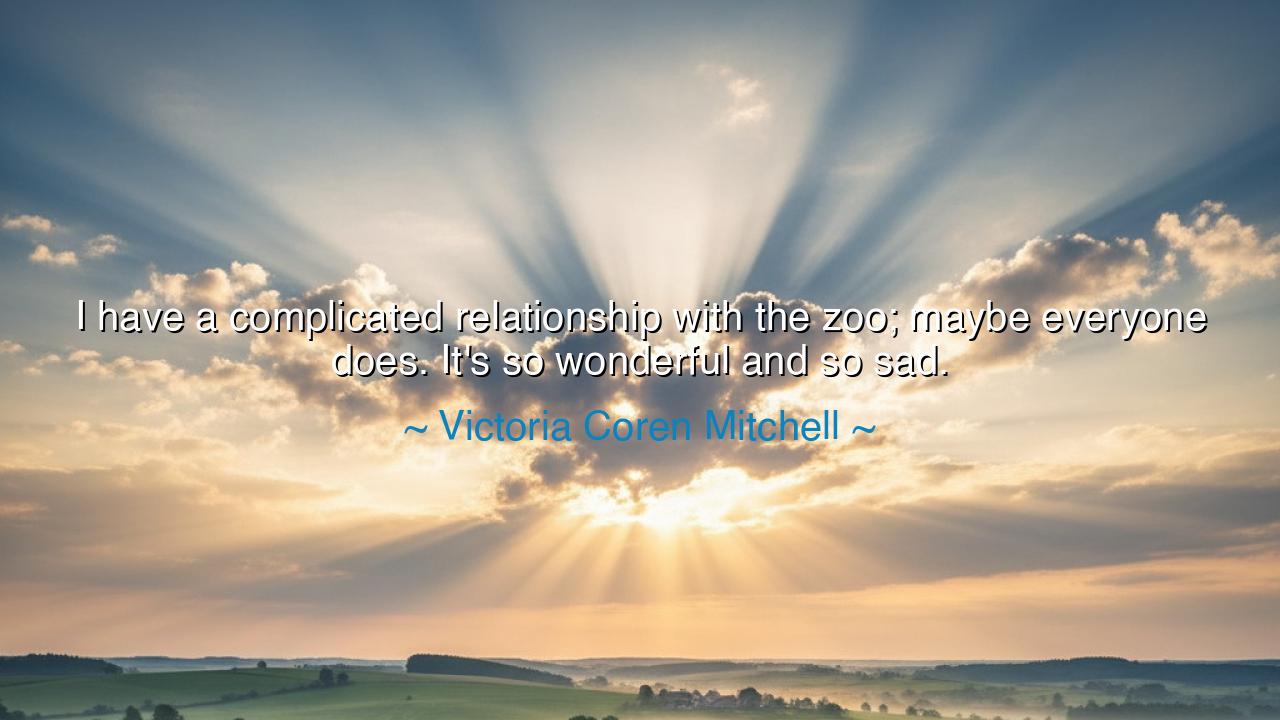
I have a complicated relationship with the zoo; maybe everyone
I have a complicated relationship with the zoo; maybe everyone does. It's so wonderful and so sad.






Victoria Coren Mitchell once spoke with poignant simplicity: “I have a complicated relationship with the zoo; maybe everyone does. It’s so wonderful and so sad.” In these words, she lays bare the paradox of human dominion over the creatures of the earth. The zoo, symbol of wonder and captivity alike, embodies both the marvel of nature and the sorrow of its confinement. It is a place where beauty is displayed, yet behind the beauty lies a quiet tragedy.
From the beginning of time, humanity has stood in awe of the beasts of the earth, the birds of the sky, the creatures of the sea. Our ancestors painted their forms on cave walls, chased them across plains, worshipped them as gods. To see such power and grace up close fills the soul with awe—that is the wonderful. Yet to see them behind bars, their freedom exchanged for display, awakens grief—that is the sad. Coren Mitchell gives voice to this eternal contradiction, one that stirs in the heart of all who gaze upon captive majesty.
Consider the tale of Jumbo the elephant, once the pride of London’s Zoological Gardens in the 19th century. Crowds gathered to marvel at his size, his gentleness, his exotic presence. For children, it was joy; for the public, fascination. Yet his keepers knew he suffered in his captivity, restless and unfree. Eventually sold to Barnum’s circus, Jumbo became a spectacle until his tragic death. His life was both a testament to human fascination and a lamentation of human cruelty. Here we see the truth of Victoria’s words: the zoo is both wonderful and sad, joy and sorrow intertwined.
The complicated relationship arises because the zoo is not purely a prison nor purely a sanctuary. In many cases, it has saved creatures from extinction, protected species from the edge of oblivion, and given countless children their first glimpse of the majesty of lions, tigers, or polar bears. Yet, at the same time, no cage, however gilded, can replace the vast savannas, the endless oceans, the deep forests where these beings were meant to roam. Humanity’s love for animals leads us both to save them and to confine them.
The deeper meaning of this quote speaks to the contradictions within the human heart. We long to preserve beauty, but often we do so by restraining it. We desire closeness to nature, but in our pursuit, we alter and diminish it. The zoo becomes a mirror of ourselves—our yearning for connection and our inability to give true freedom to what we claim to love. This tension is not confined to animals alone; it is part of how we treat one another, too, torn between protection and control.
The lesson we must take is this: let our love for creation never become possession. To truly honor what we admire, we must work to preserve it in its natural state, not only in curated enclosures. Admiration must be joined with respect, curiosity with compassion. Just as children who see animals in a zoo must be taught not only to wonder but also to care, so must we balance our longing for closeness with our duty to protect freedom.
Practically, this calls us to support conservation beyond the walls of zoos. Plant trees, protect habitats, honor the earth so that future generations may see these creatures not only in enclosures but in the wild. If you visit a zoo, let it not end in wonder alone—let it inspire you to action, to donation, to awareness, to reverence for the fragile bond between humankind and beast. For the truest love of nature is not to hold it, but to let it flourish.
Thus Victoria Coren Mitchell’s reflection is more than personal sentiment. It is a wisdom for all ages: the things we find most wonderful often carry with them the shadow of sadness, and the noblest path is to hold both truths with reverence. The zoo, in its paradox, teaches us to marvel and to mourn, and from both, to learn how to love more wisely.






AAdministratorAdministrator
Welcome, honored guests. Please leave a comment, we will respond soon